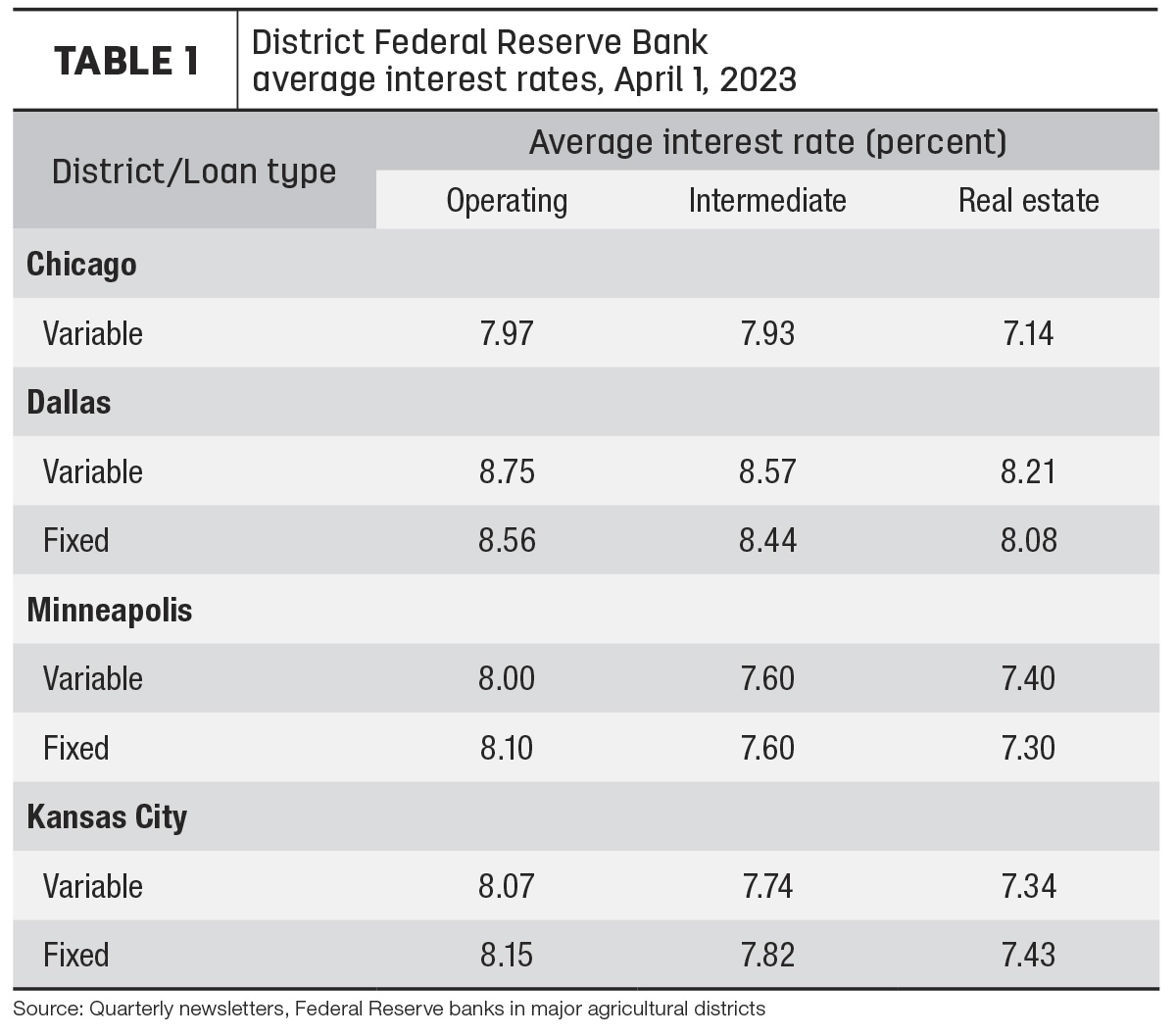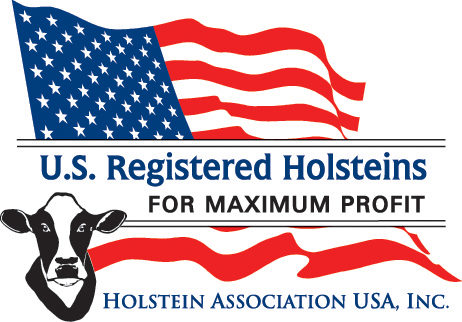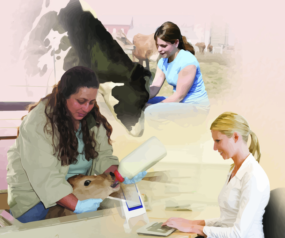Digest highlights:
- Ag loan interest rates moving above 8%
- March 2023 fluid milk sales lower; organic sales higher
- USDA offers organic dairy marketing assistance
- House farm bill listening session set in Oregon
- Proposal protects ‘common’ food names
- AGCO, Kubota sign AFBF ‘right to repair’ memoranda
- Proposal expands SNAP dairy purchase incentives
- Vitaliano: May dairy outlook
Here is a brief look at the news affecting dairy producers for the week of May 21-27, 2023.
Ag loan interest rates moving above 8%
Quarterly lender surveys from Chicago, Dallas, Kansas City and Minneapolis Federal Reserve districts indicated interest rates on all agricultural loans rose in the first quarter of 2023 (Table 1).

- Chicago: Interest rates on variable-rate operating and intermediate loans were up more than 3% compared to the same quarter a year ago.
- Dallas: Average interest rates on variable-rate loans were up about 0.7% from the previous quarter; average rates on fixed-rate loans were up about 0.6%. Interest rates across all categories were above 8%, with variable loan interest rates up about 3.25% compared to a year earlier.
- Kansas City: Districtwide, average interest rates on most variable- and fixed-rate loans increased 2.7% from the same quarter a year earlier.
- Minneapolis: Average interest rates on fixed-rate loans were up about 0.4% compared to three months earlier and about 3% compared to a year ago. Interest rates on operating loans hit 8%.
Meeting in early May, the Federal Reserve Board raised interest rates by another 0.25%, boosting the federal funds rate to 5.25%, the highest since August 2007. The increase was the 10th since last March. The next meeting of the Federal Open Market Committee is scheduled for June 13-14.
March 2023 fluid milk sales lower; organic sales higher
Total fluid milk sales trended lower in March, although sales of organic milk were up from a year earlier, according to monthly data from the USDA Agricultural Marketing Service:
- Total sales: Sales of packaged fluid milk products totaled about 3.77 billion pounds, down 0.7% from the same month a year earlier. At 10.92 billion pounds, year-to-date (YTD) sales of all fluid products were down 1.4%.
- Conventional products: Monthly sales totaled 3.51 billion pounds, down 0.9% from the same month a year earlier. YTD sales totaled 10.19 billion pounds, down 1.6% from January-March 2022.
- Organic products: March sales totaled 256 million pounds, up 1.3% from a year earlier. At 732 billion pounds, YTD sales of all fluid organic products were up 1.1%. Organic represented about 6.8% total fluid product sales in March and 6.7% YTD.
The U.S. figures are based on consumption of fluid milk products in Federal Milk Marketing Order (FMMO) areas, which account for approximately 92% of total U.S. fluid milk sales, and adding the other 8% from outside FMMO-regulated areas. Sales outlets include food stores, convenience stores, warehouse stores/wholesale clubs, nonfood stores, schools, the food service industry and home delivery.
USDA offers organic dairy marketing assistance
The USDA established an Organic Dairy Marketing Assistance Program (ODMAP) designed to help mitigate milk market volatility, higher input and transportation costs, and unstable feed supply and prices. Under the ODMAP, the USDA’s Farm Service Agency (FSA) is making $104 million available to organic dairy operations to assist with projected marketing costs in 2023, calculated using their marketing costs in 2022.
ODMAP provides a one-time cost-share payment based on marketing costs on pounds of organic milk marketed in the 2022 calendar year. Eligible producers include certified organic dairy operations that produce milk from cows, goats and sheep. Applicants must provide their USDA certification of organic status confirming operation as an organic dairy in 2023 and 2022, along with the certification of 2022 milk production.
To apply, producers should contact the FSA at their local USDA Service Center. The FSA is accepting applications between May 24-July 24.
House farm bill listening session set in Oregon
The House Committee on Agriculture will hold a 2023 Farm Bill listening session, June 2, 10:30 a.m. (Pacific time), at the Linn-Benton Community College, Albany, Oregon. Details regarding livestreaming of the event have not yet been announced.
Proposal protects ‘common’ food names
Bipartisan lawmakers in the Senate and House have introduced the Safeguarding American Value-Added Exports (SAVE) Act. The proposed language would amend the Agricultural Trade Act of 1978, directing the USDA Foreign Agricultural Services (FAS) to work with the U.S. trade representative to include the protection of commonly used terms like “Parmesan”, “chateau” and “bologna” as a priority in international negotiations.
The proposal was applauded by the Consortium for Common Food Names (CCFN), the National Milk Producers Federation (NMPF) and the U.S. Dairy Export Council (USDEC). The dairy organizations and other agricultural groups charge that the European Union has used trade negotiations and intellectual property rules to confiscate common names for their own producers – essentially monopolizing certain products in specific markets.
AGCO, Kubota sign AFBF ‘right to repair’ memoranda
The American Farm Bureau Federation (AFBF) signed two more memoranda of understanding (MOU) with two agricultural equipment manufacturers, AGCO and Kubota, providing farmers the right to repair their own farm equipment.
The MOUs, which were negotiated independently with each manufacturer, follow similar agreements AFBF entered into with John Deere and CNH Industrial Brands earlier this year. Combined, the four MOUs cover roughly 70% of the agricultural machinery sold in the U.S.
The MOUs respect the intellectual property rights of the manufacturers while setting a framework for farmers and independent repair facilities in all 50 U.S. states and Puerto Rico to access AGCO and Kubota manuals, tools, product guides and information to self-diagnose and self-repair machines, as well as support from the manufacturers to directly purchase or lease diagnostic tools and order products and parts.
Proposal expands SNAP dairy purchase incentives
While Congress debates the level of funding and recipient eligibility under the Supplemental Nutrition Assistance Program (SNAP), a proposal has been introduced in the U.S. Senate to allow SNAP participants more access to dairy products, according to the International Dairy Foods Association (IDFA).
The Dairy Nutrition Incentives Program Act of 2023, introduced by U.S. Sens. Amy Klobuchar (D-Minnesota) and Roger Marshall (R-Kansas), would provide SNAP participants with a dollar-for-dollar match for the purchase of dairy products. The program would expand the Healthy Fluid Milk Incentive Projects (HFMI) – a program currently testing best practices for incentivizing milk purchases among SNAP beneficiaries – to include additional dairy products like cheese and yogurt.
Initially authorized and funded with $20 million under the 2018 Farm Bill, HFMI is a collaboration between the USDA, the Baylor Collaborative on Hunger and Poverty and Auburn University’s Hunger Solutions Institute. For the past three fiscal years, the IDFA has worked to help support increased funding to more than 150 retail locations in Alabama, California, Georgia, New Jersey, South Dakota and Texas by the end of 2023.
Vitaliano: May dairy outlook
The current extended period of milk production growth has been weak, but downward pressure on prices continues even as inflation ebbs and consumer demand for dairy products recovers, according to NMPF’s Peter Vitaliano. Summarizing dairy markets in the May 2023 Dairy Management Inc./NMPF Dairy Market Report, he said growth in total domestic consumption during the first quarter of 2023 kept pace with both milk production and milk solids production growth. Retail price inflation that hit dairy products hard during 2022 has been quickly unwinding in recent months, as measured by annual change in the various consumer price indexes.
For more information on commercial use, dairy trade, milk production, product inventories, prices and margins, view the May Dairy Market Report.








